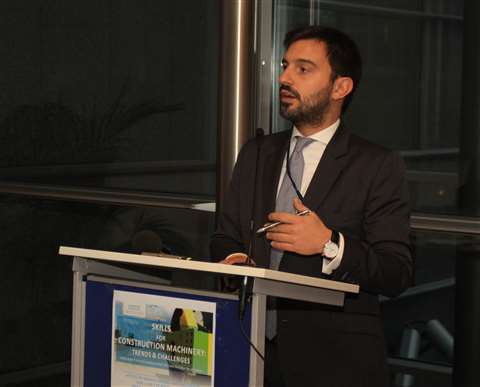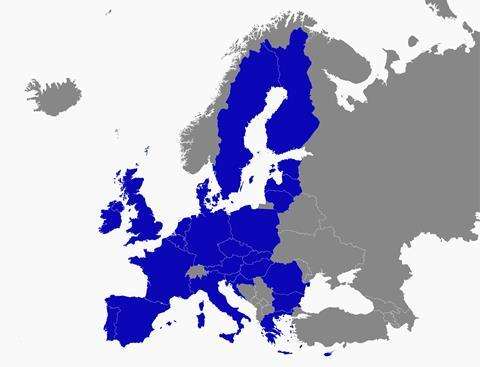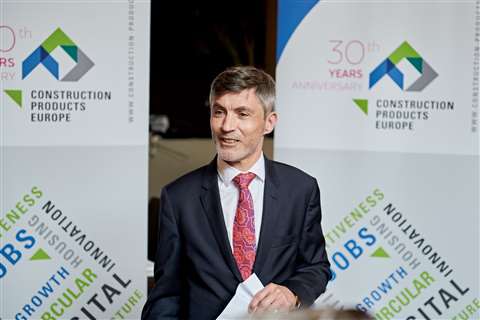Construction manifesto
12 June 2018

The European Union must transform itself digitally to remain competitive, a new manifesto from construction industry associations has stated, and as the construction sector is an integral part of the European economy, it must embrace the digital transformation across the entire value chain.
With 8.9% of GDP (gross domestic product) and more than 14 million jobs overall, the health of the construction industry is said to act like a barometer for economic prosperity.
Among the associations behind the manifesto – Smarter Construction, Stronger Economy, Inclusive Society – are FIEC (the European Construction Industry Federation), CECE (the Committee for European Construction Equipment), EBC (the European Builders Confederation), EFCA (European Federation of Engineering Consultancy Associations), and Construction Products Europe (CPE).
The manifesto calls for strong political leadership from the EU, an appropriate regulatory framework on data policy and budgetary focus on digital skills, R&D and IT infrastructure.
Kjetil Tonning, FIEC’s president, said, “The construction industry is vital for the EU economy and its products significantly impact the lifestyle and wellbeing of citizens. The health of the industry acts like a barometer for economic prosperity.”

He added, “With its pivotal role, innovation in the construction industry is good news for all of us and digitalisation will improve not only the processes and efficiency along the entire value chain, but also our lives as residents, commuters and workers.”
Key priority
CECE secretary general Riccardo Viaggi said, “Digitalisation of the construction equipment sector has been a key priority for CECE. We recognise the importance of working in a value chain approach and, as the manifesto reads, all industry representatives pledge to collaborate intensively, to lead and support the industry in order to enable a successful digital transformation of the construction industry.”

EBC president Patrick Liébus said, “It is of utmost importance that the whole construction value chain defines together the challenges and opportunities induced by digital tools and methods.
“With this manifesto, EBC and other key European associations show a strong commitment to support an inclusive digital transformation of the construction sector. Let’s build on this milestone to ensure a smooth, levelled and successful digital transition for the whole construction industry.”
The need for a collaborative approach was something that was seen as important for Tonning, who said, “The joint manifesto shows our commitment to this partnership, which should represent the entire value chain.”
He went on, “Given that digitalisation of the industry has been a key priority in FIEC’s work programme since 2016, this collaboration with other industry associations and emerging partners from outside the industry, is a logical step, aimed at ensuring that the transformation happens smoothly, without some companies being left behind.”

Tonning said, “Digitalisation of the construction sector must be one of the main priorities of the EU political agenda.
“Other industries have already benefited from EU support and we call on the policy makers to get behind the construction industry and work with us on our road map, to support the change.”
Viaggi pointed out that the European construction industry was already adjusting to the digital transformation, but that support from EU policymakers was crucial.
Appropriate
He said an appropriate regulatory and financial framework at the European level was needed to enhance the forward-looking strategy. It was said that there was a need for policy makers to prioritise this initiative within Horizon Europe, which will follow the Horizon 2020 framework.
Anticipating its new focus, the construction sector is uniting to urge the European Commission to focus the framework programme on digitising Europe’s construction sector to strengthen its industrial competitiveness and global leadership.
To remain competitive, the European Union must transform itself digitally, said CECE. As an integral part of the European economy, construction must embrace the digital transformation across the entire value chain, it added.

“Digitalisation of the construction industry responds to the sector’s main challenges such as lack of skilled workforce, energy efficiency, lagging productivity, sustainability and many others,” said CECE. “Building on Europe’s strength in the field of engineering and design, a strong network facilitating transfer of knowledge, expertise and capabilities needs to be put in place at the European level.”
EBC agreed that digitalisation had “the huge potential of increasing productivity, enhancing the quality and reducing the costs of buildings, while improving safety and working conditions”.
It also felt that digitalisation was not a goal in itself but a means to achieve the European Union priorities in terms of employment, energy efficiency and circular economy goals, etc. For this purpose, the digital transformation of the construction industry also needs supportive European and national regulatory and financial frameworks, it said.
EBC secretary general Eugenio Quintieri said, “EBC has intensively engaged with other key construction actors to outline the main political priorities of the construction industry in the field of digital construction. In this context, our construction SMEs and craftsmen fully support the co-operation with major construction stakeholders to ensure that the whole construction value chain will reap the benefits of digitalisation.
“Now, the digitalisation of the construction sector must be one of the main priorities of the EU political agenda, with a leading role for micro, small and medium-sized enterprises.”
Importance of sector
CPE said that, supported by key indicators, the industry was demonstrating the importance of the sector and repeated the request that digitalisation construction should become one of the main priorities of the EU political agenda.

It said that the industry needed an appropriate regulatory framework on data policy, and that through the manifesto, the signatories pledged to collaborate intensively with the EU Institutions, to lead and support the industry to enable a successful digital transformation of the construction industry.
Christophe Sykes, CPE director general, said he was pleased and proud that collaboration was the natural way forward for the European construction industry associations.
“Construction is one of the pillars of our economy and society. Digitalisation is transforming the way we operate and our industry wants to be play a leading role in its transformation,” he added.




